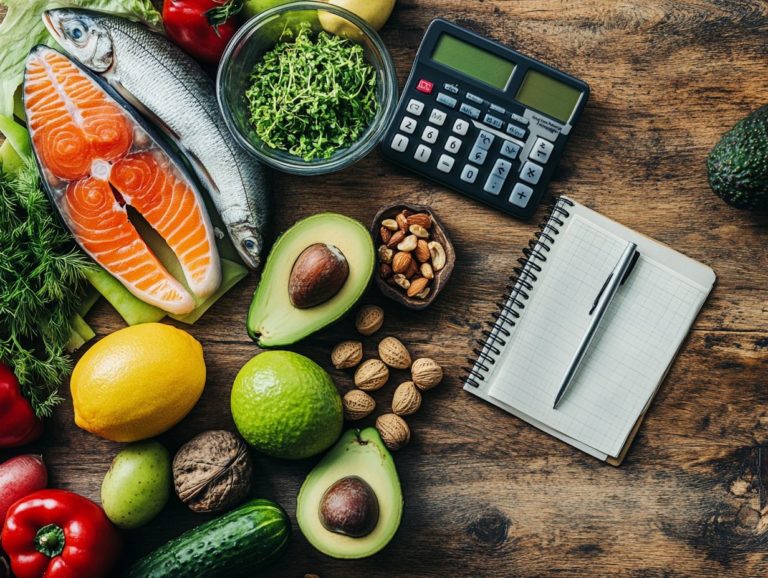Keto Diet: Recommended Supplements
Contents
- Understanding the Keto Diet and Supplements
- Key Takeaways:
- What Are the Recommended Supplements for the Keto Diet?
- How to Choose High-Quality Supplements for the Keto Diet?
- 1. Look for Third-Party Testing
- 2. Check for Clean Ingredients
- 3. Consider Your Individual Needs
- Frequently Asked Questions
- Can supplements help with the ‘Keto flu’?
- Are there any supplements that can enhance weight loss on the Keto Diet?
- Are there any supplements that should be avoided while on the Keto Diet?
- Do I need to take supplements every day while on the Keto Diet?
Understanding the Keto Diet and Supplements
Embarking on a keto diet can be an exhilarating journey toward improved health. However, it also presents challenges such as cramps, brain fog, and the need for proper nutrient replenishment.
To maximize the benefits of a low-carb lifestyle, understanding the right supplements is essential. This article explores key supplements recommended for those on the keto diet and highlights potential side effects, including nutrient deficiencies and electrolyte imbalances.
Discover valuable tips on choosing high-quality supplements that align with your needs. Consider dietary composition and individual health factors.
So, dive in and discover how to elevate your keto experience to new heights!
Key Takeaways:

- Electrolytes, MCT oil, and Omega-3 fatty acids are vital for a successful keto journey. Don t overlook B vitamins and magnesium citrate they’re essential for energy and muscle health.
- The keto flu, nutrient deficiencies, digestive issues, and increased risk of kidney stones are potential side effects of the keto diet. Proper supplementation, including a daily fiber supplement and potassium chloride for balanced potassium intake, can help mitigate these risks.
- When choosing supplements for a keto diet, look for third-party testing and clean ingredients. Consider individual needs to ensure high-quality and effective supplementation, particularly focusing on filling nutrient gaps and supporting digestive health.
What Are the Recommended Supplements for the Keto Diet?
The ketogenic diet, often called the keto diet, is a low-carb, high-fat dietary strategy designed to usher your body into a state of ketosis. This approach has gained tremendous popularity, and for good reason; it offers compelling benefits such as weight loss, enhanced energy levels, sharper mental clarity, and overall improved health benefits.
However, as you embark on this dietary journey, be aware of potential challenges like electrolyte imbalances and nutrient deficiencies. It’s crucial to evaluate various dietary supplements, including a comprehensive multivitamin supplement, to ensure you maintain your overall health and well-being throughout the process.
1. Electrolytes
Electrolytes think sodium, potassium, and magnesium (including potassium chloride) are essential for maintaining fluid balance, nerve function, and muscle contractions, especially if you re embracing a ketogenic diet. With lower carbohydrate intake, the risk of electrolyte imbalances becomes more pronounced, and you ll want to keep an eye on that.
When you cut back significantly on carbs, your body starts shedding more fluids, which can lead to the loss of these critical minerals. You might notice the effects of electrolyte depletion manifesting as muscle cramps, fatigue, or even that frustrating brain fog. For anyone following this low-carb lifestyle, it s vital to focus on your diet, ensuring you re incorporating keto-friendly foods that are rich in these essential nutrients, such as green superfoods.
Consider adding the following to your plate:
- Avocados
- Leafy greens
- Nuts
- Seeds
While these food sources can certainly help, you may find that electrolyte supplementation becomes necessary to maintain optimal levels and alleviate any discomfort, paving the way for a smoother transition into ketosis.
2. MCT Oil
MCT oil, a type of fat that is easily digested and converted into energy, has become a go-to supplement for anyone embracing the ketogenic diet. It offers a swift source of energy and elevates ketone levels in your body, making it an essential ally for boosting energy production during ketosis.
This versatile oil not only fuels your body effectively but also plays a crucial role in weight loss by encouraging fat oxidation and curbing appetite, helping you effortlessly maintain a calorie deficit.
MCT oil also enhances cognitive function, providing immediate fuel to your brain that can sharpen your focus and clarity.
Incorporating MCT oil into your meals is both simple and enjoyable. You can drizzle it over salads, blend it into smoothies, or stir it into your coffee for a deliciously satisfying boost. For snacks, consider mixing it into nut butter or yogurt. This offers you nutrient-rich options that align perfectly with your ketogenic lifestyle.
3. Omega-3 Fatty Acids
Omega-3 fatty acids, present in fish oil supplements and select plant-based sources, are essential for nurturing heart health, bolstering the immune system, and curbing inflammation. They are a crucial component of a well-rounded ketogenic diet.
You can obtain these fatty acids from a variety of sources, including fatty fish like salmon, mackerel, and sardines, as well as plant-based options such as flaxseeds, chia seeds, and walnuts. It s vital to balance your omega-3 intake with omega-6, as an excess of omega-6 may trigger heightened inflammatory responses in your body.
By weaving omega-3s into your ketogenic diet, you may notice significant health improvements. These fatty acids have been linked to reduced inflammation, enhanced joint health, and a potential decrease in the risk of chronic diseases.
Incorporating them can elevate your metabolic efficiency and bolster your overall well-being. Omega-3s are a key consideration for anyone embracing a ketogenic lifestyle!
4. Probiotics
Probiotics are your allies in maintaining a healthy digestive tract. Their importance becomes even more pronounced when you’re navigating the ketogenic diet, which can sometimes stir up digestive challenges. Probiotics help maintain gut health by balancing your intestinal flora an essential element for proper digestion and overall wellness.
By enhancing nutrient metabolism, probiotics enable your body to absorb crucial nutrients efficiently while warding off pesky digestive issues like constipation, bloating, and diarrhea.
Make sure to include a variety of probiotic sources in your keto meal plan for maximum benefits! Additionally, focusing on fiber intake through a daily fiber supplement can support your digestive health.
Fermented foods like sauerkraut, kimchi, and yogurt made from low-carb dairy options can be delightful additions that not only elevate your meals but also support your digestive health.
5. Vitamin D

Vitamin D is a fat-soluble nutrient that plays a pivotal role in calcium absorption, bone health, and immune system support. This makes it particularly crucial for you, especially if you re following a ketogenic diet, as you may face a higher risk of vitamin D deficiency due to limited food sources.
You can obtain this nutrient not only through what you eat but also through sunlight exposure, as your skin synthesizes it when basked in the sun. This underscores the importance of being mindful about sun exposure, alongside your nutritional intake.
Maintaining adequate levels of this essential nutrient is key not just for your physical health, which it supports by helping prevent conditions like osteoporosis and fractures, but also for your mental well-being. Inadequate levels of vitamin D have been linked to mood disorders and cognitive decline.
Don t wait ensure you re getting enough Vitamin D for your health today! If you find it challenging to meet your daily vitamin D requirements through diet or sunlight, supplementation can be a practical solution, ensuring your body can efficiently absorb calcium and support your overall health.
6. Magnesium
Magnesium is an essential mineral that plays a pivotal role in over 300 body processes. It s crucial for energy production and muscle function, which is why magnesium citrate is often a go-to supplement for those on the ketogenic diet who might encounter cramping or signs of electrolyte imbalances.
Magnesium also supports bone health and heart function. For those adhering to a low-carb lifestyle, adequate magnesium intake is vital not only to alleviate muscle cramps and spasms but also to enhance your energy metabolism. This boost is especially important as your body transitions from relying on carbs to burning fat.
Magnesium plays a key role in maintaining normal blood pressure and supporting heart health, contributing to your overall wellness. While foods like leafy greens, nuts, seeds, and whole grains can help raise your magnesium levels, those following keto might find these options somewhat limited.
That s where supplementation shines as a practical solution, ensuring you efficiently meet your mineral needs, particularly when dietary restrictions come into play.
7. Digestive Enzymes
Digestive enzymes are essential for breaking down food and effectively absorbing nutrients, especially when you embark on a ketogenic diet, which can change your digestion patterns and potentially lead to discomfort.
These enzymes proteases, lipases, and amylases each have vital roles in your digestive process. Proteases work to break down proteins into amino acids, making them more accessible for absorption. Lipases break down fats into fatty acids and glycerol, which is particularly important if you re enjoying meals with higher fat content.
While amylases may not have a starring role on a ketogenic diet due to the reduced carbohydrate intake, they still assist in digesting any starchy foods that might occasionally make an appearance. Proper dietary fat breakdown is crucial for those following a ketogenic Mediterranean diet or other variations.
By ensuring that these enzymes are present and functioning at their best, you can enhance nutrient metabolism, supporting not only your digestive health but also contributing to your overall wellness and immune system support throughout your ketogenic meal plan. This is particularly crucial in a ketogenic diet where nutrient gaps can occur.
What Are the Potential Side Effects of the Keto Diet?
While the ketogenic diet presents a wealth of health benefits ranging from effective weight loss to enhanced energy levels it s essential to be mindful of potential side effects. These can include the often-discussed ‘keto flu’, electrolyte imbalances, nutrient deficiencies, digestive challenges, and an elevated risk of kidney stones.
Being informed about these aspects will enable you to navigate the diet more effectively and make the most of its advantages.
1. ‘Keto Flu’
The term ‘keto flu’ describes a set of common symptoms you might encounter when starting a ketogenic diet. These symptoms can include fatigue, headaches, nausea, cramping, and even a touch of brain fog.
This condition primarily stems from your body s adjustment period as it shifts from utilizing glucose to burning fat for energy. During this transition, it’s not uncommon for your energy levels to take a nosedive, leaving you feeling drained and lethargic.
Typically, these uncomfortable symptoms can stick around for a few days to over a week, varying based on individual responses and adherence to the diet. To tackle these discomforts, it s crucial to prioritize hydration, as your body may experience elevated water loss with the notable decrease in carbohydrate intake.
Additionally, supplementing with key electrolytes, which help maintain fluid balance in your body, like sodium, potassium, and magnesium can be quite beneficial. Consider making gradual dietary adjustments, easing into the ketogenic lifestyle rather than making a sudden leap, as this approach can help smooth the transition and lessen the more intense effects of keto flu.
2. Nutrient Deficiencies
Nutrient deficiencies can become a concern when you adopt a strict ketogenic diet. Excluding various food groups can create gaps in essential nutrients, including vital vitamins and minerals.
You might fall short on B vitamins, especially B12 and folate. These are essential for energy production and the formation of red blood cells.
Potassium is another critical mineral. It helps maintain electrolyte balance and supports healthy muscle function, yet it can often be insufficient for those on a ketogenic diet.
Other crucial nutrients, such as vitamin D for bone health and calcium, may also be lacking.
To address these deficiencies, incorporate nutrient-rich foods like leafy greens, avocados, and nuts into your meals. You might also consider supplements designed to support the ketogenic diet, such as omega-3 supplements and vitamin B complex, ensuring your body receives the necessary nutrients while promoting effective fat metabolism.
3. Digestive Issues

Individuals on a ketogenic diet may experience digestive issues like constipation or diarrhea. These challenges often arise from changes in fiber intake and the high-fat nature of the diet.
A significant reduction in carbohydrates means less dietary fiber, which can disrupt gut balance. Incorporating a daily fiber supplement may help maintain a healthy digestive tract.
Include keto-friendly, fiber-rich foods such as:
- Avocados
- Nuts
- Seeds
- Non-starchy vegetables
Including digestive enzymes in your regimen may enhance nutrient absorption and aid in the breakdown of fats. Supplementation with exogenous ketones might also support maintaining ketosis.
4. Increased Risk of Kidney Stones
The ketogenic diet may elevate the risk of kidney stones for some individuals. A higher intake of dietary fat and reduced carbohydrates can alter urine composition.
This dietary shift can lead to increased levels of oxalate and uric acid, both of which contribute to stone formation. Stay well-hydrated; increasing fluid intake can dilute these substances and decrease the likelihood of stones.
Mindfully adjusting your diet such as including more low-oxalate foods and balancing fat sources with sufficient calcium is essential. Regularly monitoring your urine pH can provide insights into your renal health.
How to Choose High-Quality Supplements for the Keto Diet?
Selecting high-quality supplements for the keto diet is essential for optimal health and wellness. The distinctive dietary requirements of this low-carbohydrate, high-fat lifestyle make informed choices vital for your well-being.
Before starting any supplements or making significant dietary changes, it’s always a good idea to consult with a healthcare provider for personalized advice.
1. Look for Third-Party Testing
When selecting supplements for your ketogenic diet, it is crucial to prioritize third-party testing. This step ensures that the products you choose meet stringent quality and safety standards, granting you reliability and peace of mind as a consumer.
Third-party testing is vital in the supplement industry because it validates product claims and confirms that formulations contain the ingredients and dosages advertised. This independent verification fosters trust between brands and their customers, especially in a market brimming with options.
Ensuring supplements like omega-3 fatty acids and MCT oil are tested can be critical for those following a ketogenic lifestyle.
As a discerning consumer, you can identify reputable brands by seeking certifications from recognized organizations like NSF International or USP, which indicate adherence to rigorous testing protocols. Armed with this knowledge, make informed choices that enhance your overall experience while effectively adhering to the specific requirements of your ketogenic lifestyle.
2. Check for Clean Ingredients
Prioritize clean ingredients now for better health! Checking for clean ingredients in dietary supplements is essential for anyone following a ketogenic diet. Many products on the market can contain additives or fillers that are not keto-friendly and could throw off your dietary regimen.
By carefully checking ingredient labels, you can steer clear of common culprits like sugar alcohols, artificial sweeteners, and excessive starches that might disrupt your state of ketosis. Prioritizing whole-food-based supplements not only helps you maintain a stable state of ketosis but also promotes overall health.
Consider supplements that provide vitamin D, vitamin A, vitamin C, and vitamin K for comprehensive nutritional support. These clean alternatives often provide essential vitamins and minerals without the unwanted extras that can diminish the benefits of your ketogenic lifestyle.
For instance, green superfoods can be an excellent source of essential nutrients without disrupting ketosis. Making informed choices enables you to sustain your dietary goals while enjoying the nutritional support necessary for energy and vitality.
3. Consider Your Individual Needs
In terms of selecting supplements for your keto diet, it is essential to consider your individual needs. Each person’s health status, dietary preferences, and lifestyle can significantly shape their supplementation requirements.
By taking the time to assess your specific health goals, any pre-existing medical conditions, and your unique lifestyle habits, you can make informed choices that align perfectly with your keto journey.
For example, if you have certain health concerns, you might want to focus on maintaining electrolyte balance, while those who lead an active lifestyle could greatly benefit from enhanced energy support.
Reflecting on your daily routines and overall well-being will enable you to choose the most suitable supplements. This way, you can maximize the benefits of the ketogenic lifestyle while minimizing potential side effects.
Customizing your approach not only enhances the enjoyment of the diet but also makes it far more effective in helping you achieve your personal health goals and ensuring dietary replenishment.
Frequently Asked Questions

-
What is the Keto Diet and why are supplements recommended?
-
The Keto Diet is a low-carbohydrate, high-fat diet that forces the body to burn fat for fuel instead of glucose. Because of the strict dietary restrictions, supplements are recommended to ensure that the body is getting all the necessary nutrients.
Supplements like a multivitamin supplement, MCT oil, and omega-3 fatty acids are particularly beneficial.
-
What are some common supplements recommended for the Keto Diet?
-
Some common supplements recommended for the Keto Diet include MCT oil, magnesium, electrolytes, and omega-3 fatty acids. These supplements help support energy levels, promote proper digestion, and maintain overall health.
A vitamin B complex can also assist in energy production, and potassium chloride can aid in maintaining electrolyte balance.
Can supplements help with the ‘Keto flu’?
Yes, supplements can help alleviate the symptoms of the ‘Keto flu’, which can include fatigue, headaches, and muscle cramps.
Electrolyte supplements can replenish important minerals lost during the initial stages of the Keto Diet. Incorporating magnesium citrate and potassium chloride can be particularly effective.
Are there any supplements that can enhance weight loss on the Keto Diet?
There are some supplements that may aid in weight loss on the Keto Diet, such as supplements that provide additional ketones to help the body enter ketosis, medium-chain triglyceride (MCT) oil, and green tea extract.
Adding omega-3 supplements can also support overall health and weight loss. Supplements shouldn t be the only method for weight loss and should be used in conjunction with a healthy diet and exercise.
Are there any supplements that should be avoided while on the Keto Diet?
While everyone’s body may react differently, some supplements that should be avoided while on the Keto Diet include high doses of caffeine and sugar-filled protein powders.
These can potentially hinder weight loss and disrupt the body’s state of ketosis. Whole grains can impact your dietary composition and ketosis as well.
Do I need to take supplements every day while on the Keto Diet?
Daily supplements are key to thriving on the Keto Diet! They help fill any nutritional gaps and support overall health.
For instance, potassium chloride and magnesium citrate can prevent imbalances and reduce fatigue. Vitamins like vitamin D can aid in calcium absorption and support bone health.
A daily fiber supplement can also help maintain a healthy digestive tract. Ensure you consult with a healthcare professional right away to identify the best supplements for your unique needs.
Start your journey to optimal health today by discussing your supplement needs with a professional!






